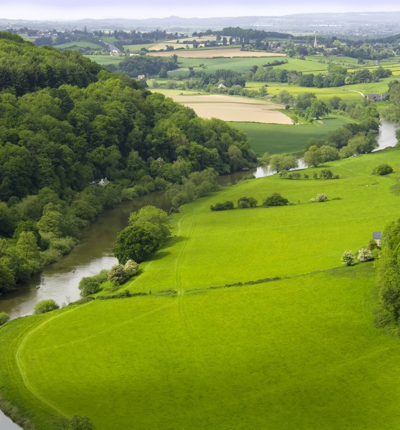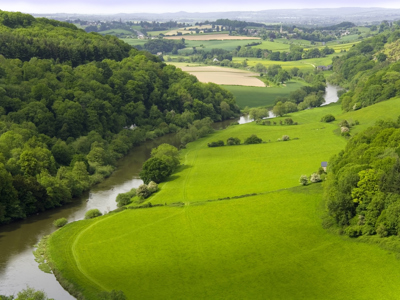
River Action challenges Environment Agency for failing to protect rivers from agricultural pollution
A charity campaigning to stop pollution across the UK’s rivers has issued a legal claim in the High Court to save the River Wye from pollution caused by intensive agricultural practices.
Posted on 14 March 2023
River Action has applied for judicial review of the Environment Agency’s enforcement of regulations that govern the amount of organic manure and artificial fertiliser that can be spread on agricultural land from which water runs off and leaches into the River Wye.
The Wye is heavily polluted and suffers from prolonged algal blooms that turn the river an opaque green, suffocating plant and wildlife. The blooms are caused primarily by a substantial surplus of phosphorus in the soils of the river catchment, which in turn leaches into the river. The most significant contributor is known to be the very rapid recent growth of the region’s intensive poultry industry, the manure of which is spread widely throughout the agricultural land of the catchment. There are now over 20 million chickens now being reared in the Wye catchment at any one time, equating to approximately 25 per cent of UK poultry production.
The Wye was designated a Special Area of Conservation (SAC) to protect the river’s once-famous extensive Ranunculus river weed beds. However over 90 per cent of the river’s Ranunculus has now been lost, smothered by the algal blooms. Consequently, the river is not meeting the SAC conservation status specified by the Habitats Directive. In June 2020, an unprecedented thick algal bloom extended for over 140 miles, almost the entire length of the river.
A study published in May 2022 by the University of Lancaster, Re-focusing Phosphorus use in the Wye Catchment (RePhoKUs Study) concluded that 60-70 per cent of the river’s total phosphorus load now comes from agriculture and an excess load of 3,000 tonnes of phosphorus is still being added to the river catchment area each year. This excess is accumulating at a rate equivalent to 17kg of phosphorus per hectare when the national average is 7kg per hectare.
River Action claims that the Environment Agency is failing to apply the Reduction and Prevention of Agricultural Diffuse Pollution (England) Regulations 2018, known as ‘the Farming Rules for Water’ (FRfW), which should prevent the spreading of this excess organic manure and thus prevent its nutrients entering the River Wye.
The Farming Rules for Water prohibit applications of “organic manure or manufactured fertiliser” to farmland in a way that would raise nutrient levels above what is “needed by the crop and the soil”.
However, statutory guidance from Department of Environment Food and Rural Affairs (DEFRA) states that land managers should plan to avoid applying organic manures that raise the Soil Phosphorus Index above target levels for soil and crop on land over a crop rotation, unless they can demonstrate that:
- it is not reasonably practicable to do so
- they have taken all appropriate reasonable precautions to help mitigate against the risk of diffuse agricultural pollution
As crop rotation can take place over several years, River Action says this approach fails to protect the River Wye from phosphorus pollution.
It says the Environment Agency is slavishly following the statutory DEFRA guidance at the expense of enforcing the Farming Rules for Water.
It adds that by not applying the rules in a way that fulfils the Habitats Directive, the Environment Agency has breached regulation 9(3) of The Conservation of Habitats and Species Regulations 2017 (the Habitats Regulations).
The application for judicial review was issued at the High Court on Tuesday 14 March.
Charles Watson Chairman and Founder of River Action said:
“The severe ecological collapse of the iconic River Wye is one of the great environmental scandals of our times. The sickening tragedy is that this could have been seriously mitigated had the Environment Agency enforced existing environmental regulations to prevent the excess application of animal waste on land that was already oversaturated with nutrients. The irony is that the same government that introduced these regulations is giving the EA explicit guidance not to enforce them. This unlawful conduct of the EA has to stop now.
River Action is represented by Leigh Day environment team solicitor Ricardo Gama, who said:
“The Farming Rules for Water were introduced in 2018 specifically to deal with the issue of agricultural pollution in rivers like the Wye but from documents we’ve seen it’s clear that the Environment Agency is choosing to apply the rules in a way that is inconsistent with their own interpretation of how the rules are supposed to work. This means that manure –essentially an industrial waste product from meat and dairy production – is allowed to flow into our waterways with impunity. Our client hopes this claim will force the EA to reassess their approach and start applying the rules properly.”



